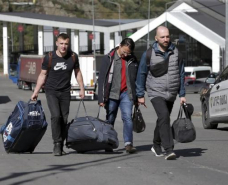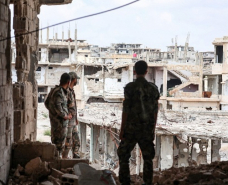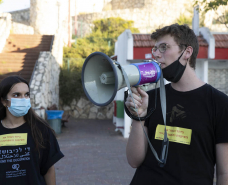Thou Shalt Not Kill

By Chris Hedges, Truthdig
The military in the United States portrays itself as endowed with the highest virtues—honor, duty, self-sacrifice, courage and patriotism. Politicians, entertainers, sports stars, the media, clerics and academics slavishly bow before the military machine, ignoring its colossal pillaging of state resources, the egregious war crimes it has normalized across the globe, its abject service not to democracy or freedom but corporate profit, and the blind, mind-numbing obedience it inculcates among its members. A lone soldier or Marine who rises up inside the system to denounce the hypermasculinity that glorifies violence and war, who exposes the false morality of the military, who refuses to kill in the service of imperial power, unmasks the military for what it is. And he or she, as Chelsea Manning has learned, swiftly pays a very, very heavy price.
Spc. Robert Weilbacher as a new Army combat medic stationed in South Korea listened to stories told by combat veterans, many suffering from trauma and depression, about the routine and indiscriminate slaughter of civilians in Iraq and Afghanistan. He was horrified. He had believed the propaganda fed to him over the years. He considered himself a patriot. He had accepted the notion that the U.S. military was a force for good, intervening to liberate Iraqis and Afghans and fight terrorists. But after hearing the veterans’ tales, his worldview crumbled. He began to ask questions he had not asked before. He began to think. And thinking within any military establishment is an act of subversion. He soon decided he did not want to be part of an organization that routinely snuffed out the lives of unarmed people, including children. He applied in February 2014 for a classification known as Conscientious Objector (1-0).
He instantly became a pariah within his unit. No one wanted to associate with him. He was taunted as a “traitor,” “coward,” “faggot” and “hippie.” He was assigned to the most demeaning jobs on the base. And the military bureaucracy began making him jump through hoops that he is still trying to negotiate two years later. He became an example to his fellow soldiers of the physical and emotional harassment, as well as humiliation, that is visited on all who dare within the military to challenge the sanctity of war and discipline.
“I feel as if my own government is torturing me,” he said when I reached him by phone in his barracks at Fort Campbell, Ky.
Weilbacher, 27, grew up in poverty, raised by a single mother, in the inner city of Columbus, Ohio. As a student at Ohio State University, where he was a political science and English major, he started two organizations to help feed the homeless. He was an idealist. He wanted to serve humanity. And, in the warped culture in which he lived—American culture—the best way to do that was to join the military, which was organized, he thought, around “noble ideals.”
“The public perception, including at Ohio State, which has a big ROTC program, is that soldiers are heroic,” he said. “They’re serving their country. They’re in the best Army in the world. I didn’t question this. I watched the commercials with the climatic background music for the Marine Corps—‘the few, the proud, the Marines.’ The Marines have the biggest masculine factor. I thought, I have the credentials to be a Marine officer.”
“Every message given to me by popular culture was that violence was a means of conflict resolution,” he said. “This was especially true in the inner city where I grew up and where there is a lack of education. Video games, such as ‘Call of Duty,’ normalize violence. You don’t realize the impact it has. Your conscience is subverted. In ‘Call of Duty’ you get rewarded for killing—you rank up in the system. The message is if you like ‘Call of Duty’ you’ll like the military. And, of course, the military also incentivizes killing. If you do well at marksmanship you get rewarded with three-day passes. You only think about the points you can get from becoming an expert marksman. You don’t think about the act of taking a human life. Every aspect of popular culture incentivizes violence, from television shows to movies like ‘American Sniper.’ Killing is presented as noble. Those who kill are supposed to be heroes. And this prepares us for the military.”
When he graduated from college he signed up for Marine Officer Candidates School and was sent to Quantico, Va., for boot camp.
“When we marched in formation we shouted out cadences,” he said. “Most of the cadences were about killing. We shouted ‘Kill! Kill! Kill!’ We shouted ‘What makes the green grass grow? Blood! Blood! Blood!” We shouted ‘AT&T. Reach out and touch someone.’ The intent of OCS [Officer Candidates School] was to normalize violence, to condition us. It was very effective. Again, I didn’t think about what I was doing. All I was thinking about was being a Marine Corps officer.”
But four weeks into his training in early 2012 he was injured and had to drop out. He was devastated. He did not want to begin the whole application process again with the Marines, and he enlisted in the Army in April 2013. He went to Fort Sill, Okla., for basic training. He was then trained as a medic (68W) at Fort Sam Houston, Texas. He enrolled in airborne school at Fort Benning, Ga., and during the second week of training was injured during a practice for landing falls.
In December 2013 he was deployed to Camp Hovey in South Korea, 10 miles from the border with North Korea. He was attached as a medic to the 4-7 Cavalry. He began to hear disturbing stories about the wars in the Middle East, not the glorified stories spun out by recruiters, the media or the entertainment industry, but stories about whole families being blown up or gunned down by U.S. troops in the streets of Iraq and Afghanistan. He lived among soldiers who were suffering from post-traumatic stress disorder. Many were drinking heavily. He listened to them talk about being prescribed anti-depressants by Army doctors and then being redeployed to Iraq and Afghanistan. He may have been a medic, but he was required to carry a weapon and to use it in combat. He knew that for him, to do so would be impossible.
“I joined the military because I wanted to help people, to fight for the greater good,” he said. “And then I learned about innocent people being routinely blown up in war. I started researching the statistics on collateral damage in Iraq and Afghanistan.”
“A medic in the Army weaponizes soldiers so they can go back out and kill,” he said. “When we are trained as medics we are told that our task is to preserve fighting strength. Being a medic in the Army is not about helping the people who need it most. Treatment is first directed towards casualties that have the best chance to survive. Army medics exist to perpetuate warfare.”
He discovered the Iraq Body Count website and was appalled by what he learned there. He began to devour the writings and statements of Martin Luther King Jr., Mahatma Gandhi, Noam Chomsky, Howard Zinn, the Rev. John Dear, Muhammad Ali and the Dalai Lama. He could no longer watch violent movies or play violent video games.
“I began to read about the wars in Vietnam and World War II,” he said. “I read about Nagasaki, Hiroshima, Agent Orange, radiation and how it’s still affecting people today, how people are still dying or being born with congenital defects. I found Noam Chomsky and Howard Zinn. I had never heard of them. I guess there was a good reason I had never heard of them. I read ‘A People’s History of the United States,’ by Zinn. I read ‘Understanding Power,’ by Chomsky. A lot of my influences, even though I am an atheist, came from religious figures like Gandhi, Father John Dear and King. I read ‘Pilgrimage to Nonviolence.’ I know why they do not tell us the truth about war. We have a volunteer Army. If people knew the truth it would decrease the numbers who want to join. I had been betrayed.” Then, in early February of 2014, he went online to the website of the Center on Conscience & War, led by Maria Santelli and Bill Galvin. Soon he contacted the two activists and told them he was a conscientious objector.
Everything about the military culture, from its celebration of violence and hypermasculinity to its cult of blind obedience, began to disturb him. He was disgusted by the military’s exploitation of Filipino women who worked in the numerous bars and clubs near the base where he was stationed in South Korea.
“Filipino women were brought over to sing in the bars,” he said. “They were great singers. They worked in bars where Korean women had been‘comfort women’ during the Japanese colonization. The bar owners took the passports of the Filipino women. ... Soldiers bought drinks and sexual services from these exploited women. I had a big issue with that. It demonstrated a lack of values.”
When he was off base he would meditate in Buddhist temples. That helped, he said, to keep him sane.
Although Army regulations required that his application be sent to the Department of the Army Conscientious Objector Review Board (DACORB) within 90 days, it took more than 200 days for the document to arrive there. On Dec. 16, 2014, he was granted status as a conscientious objector and an honorable discharge. But the deputy assistant secretary of the Army for review boards, Francine Blackmon, unilaterally overrode the DACORB determination and denied his application, even though Army regulation AR 600-43, Par. 2-8, states that a review board decision is final. Now, in a final bid to achieve conscientious objector status, he has turned to the American Civil Liberties Union.
“I have obeyed the rules during the whole process,” he said. “But in the military there is a double standard. If I do not obey the regulations I get court-martialed. If they do not obey the regulations nothing happens. It is I who suffers. If I lose this last bid I cannot reapply.”
This will be his last bureaucratic battle with the Army. He has followed the rules for two years. He will not, he said, be in the Army in 2017 at the scheduled end of his tour.
“If I’m forced to remain in the Army, I expect to eventually receive an order that I—as an objector—will be unable to comply with, resulting in a court-martial.”
The opinions expressed are solely those of the reporter and Robert Weilbacher and do not represent the United States Army in any way.
This article first published on Truthdig on Jun 7, 2015.
Countering Military Recruitment

WRI's new booklet, Countering Military Recruitment: Learning the lessons of counter-recruitment campaigns internationally, is out now. The booklet includes examples of campaigning against youth militarisation across different countries with the contribution of grassroot activists.
You can order a paperback version here.








